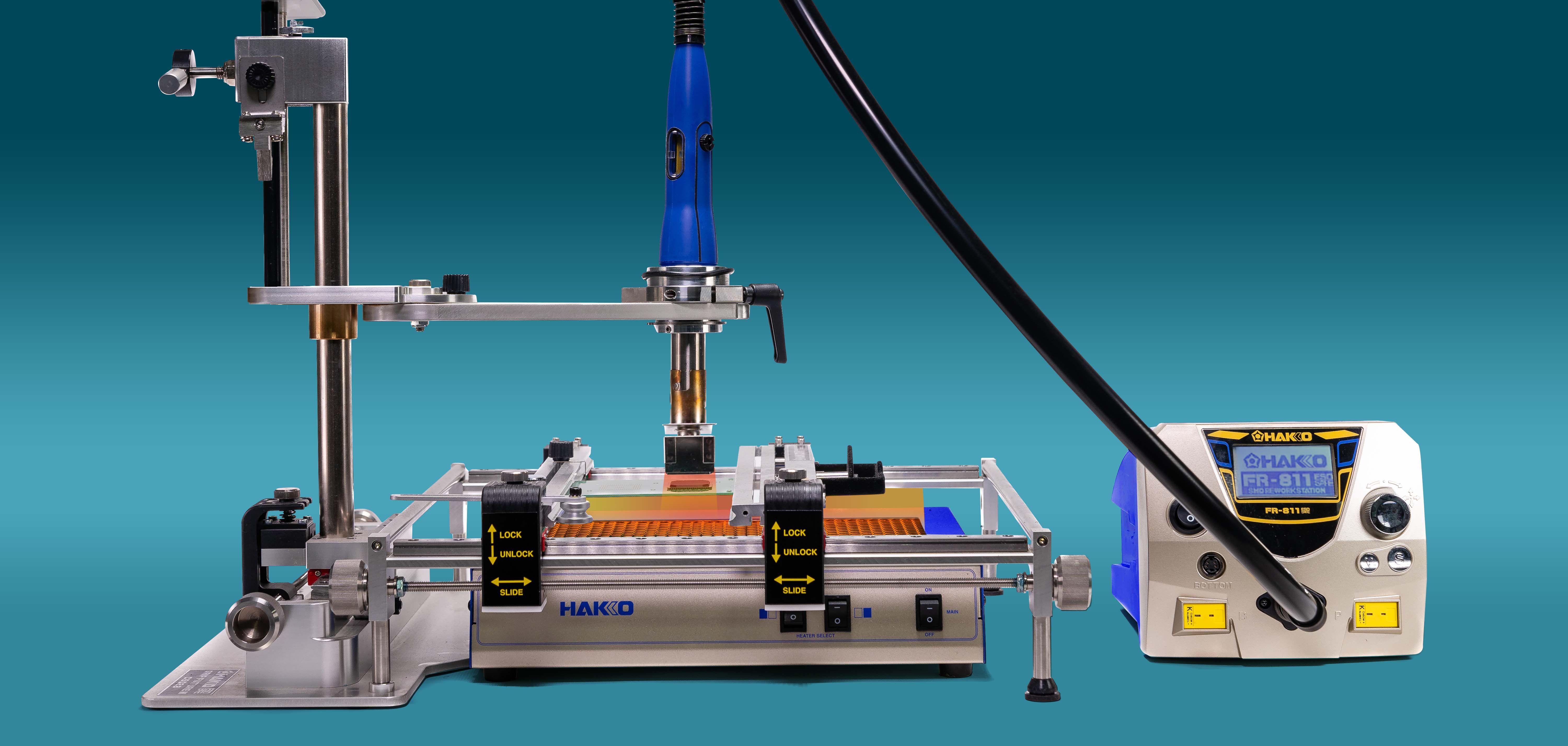Hello!
 Depending on the applications and the value judgment of how worthwhile it is with a given product, you might find yourself wondering about the right approach to take while reworking on PCBs. When it comes to the tools and techniques involved in heating the solder paste while assembling or reworking electronic components, there is an ongoing debate about which is the best-suited procedure for the reworking of PCBs; hot air soldering or conventional iron soldering.
Depending on the applications and the value judgment of how worthwhile it is with a given product, you might find yourself wondering about the right approach to take while reworking on PCBs. When it comes to the tools and techniques involved in heating the solder paste while assembling or reworking electronic components, there is an ongoing debate about which is the best-suited procedure for the reworking of PCBs; hot air soldering or conventional iron soldering.
Let us address this dilemma by first considering the advantages and disadvantages involved in both methods.
Hot-Air Rework Station:
Fast and Safe: Those who occasionally repair electronic gadgets, are aware of the unique benefit of using hot-air rework stations. The Hot-air reworking method allows you to quickly solder as well as de-solder any components with great accuracy. It is possible to quickly take out a faulty component from the PCBs and install the new one in just a few minutes. You can simultaneously desolder many different components in a shorter overall time. Moreover, the nozzle of your hot-air gun does not come in contact with your PCBs, so both these aspects prevent or limit potential damage to other parts of the circuit board from overheating.
Ease of use: The process adopted by the hot-air rework stations does not require the same level of near-surgical expertise compared to traditional methods so it saves your time and effort to a great extent.
 Multiple functionalities: Hot-air rework stations can also be used as primary soldering stations due to their multipurpose functionality. It is the preferred method for attaching and detaching complex and large SMD components like PLCCs, BGAs, and other more unusual packages. There are some advanced versions of hot-air soldering stations that include additional functionality such as paste screening for reattachment reflow. Due to their versatility, electronic technicians are encouraged to develop expertise in hot-air reflow. Hot-air soldering stations are comparatively superior in terms of accuracy and convenience and they are robust, versatile, and are designed for intuitive operation.
Multiple functionalities: Hot-air rework stations can also be used as primary soldering stations due to their multipurpose functionality. It is the preferred method for attaching and detaching complex and large SMD components like PLCCs, BGAs, and other more unusual packages. There are some advanced versions of hot-air soldering stations that include additional functionality such as paste screening for reattachment reflow. Due to their versatility, electronic technicians are encouraged to develop expertise in hot-air reflow. Hot-air soldering stations are comparatively superior in terms of accuracy and convenience and they are robust, versatile, and are designed for intuitive operation.
Drawbacks: One major drawback of hot-air reworking stations is that they are much more expensive than a standard iron desoldering station. Hot-air rework stations are also bulky, hence inconvenient to move; you will need to bring your work to the station itself, which may raise issues in certain situations.
Desoldering (iron) Stations:
Desoldering stations may include a variety of tools depending on the intended purpose. Some come with vacuum nozzles that enable you to remove melted solder from PCBs. Alternatively, the copper wick can be used with less setup cost. All suitable station setups should accommodate a soldering iron, several soldering tips, and conventional or a bronze sponge.
 The predominant benefit of choosing a desoldering station is probably its cost: it is significantly cheaper than a hot-air reworking station. Furthermore, desoldering stations are easier to move due to their lighter weight than their hot-air counterparts.
The predominant benefit of choosing a desoldering station is probably its cost: it is significantly cheaper than a hot-air reworking station. Furthermore, desoldering stations are easier to move due to their lighter weight than their hot-air counterparts.
Drawbacks: There is a greater risk of voltage leak damage to components from the iron tip than there is with a hot air process. Also, hot-air soldering, particularly of multiple components, can be carried out in less time and with less physical contact with the PCB, reducing the risk of heat damage to nearby components. It usually requires a higher level of dexterity and accuracy to do this with an iron, and thus your most experienced or well-trained technicians are always required to minimize errors, preventing their deployment to other jobs.
Also read:
- Laylo’s Latest Update: Fan Profiles Get Smarter, Bringing Artists Closer to Their Audience
- What is The Best Way to Get Your iPhone Repaired After They’re Broken?
- The QUASA NFT App generates interactive NFTs from various blockchains.
Conclusion
 You can certainly get by with just a soldering iron and a basic desoldering station for DIY-level projects. Some production items with less demanding dimensions (power electronics or simple products for example) are reasonably well suited to lower-skilled operators with Iron soldering stations. However, a hot-air rework station should be your first choice if you seek professional perfection and you’re in need of most of the advanced technical features.
You can certainly get by with just a soldering iron and a basic desoldering station for DIY-level projects. Some production items with less demanding dimensions (power electronics or simple products for example) are reasonably well suited to lower-skilled operators with Iron soldering stations. However, a hot-air rework station should be your first choice if you seek professional perfection and you’re in need of most of the advanced technical features.
Contact ART for a training review.
It requires professional training to perform these procedures repeatably and to the highest standards.
Thank you!
Join us on social media!
See you!






